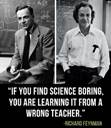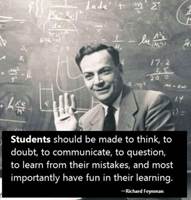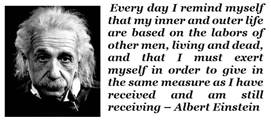 Coordinator’s View
Coordinator’s View
A Teacher: Right or Wrong?
It is observed that people use quote of Feynman, the Nobel Laureate, a great physicist who popularizes the science through his series of Lectures on Physics. The quote is quite stimulating. Yet, perhaps he may not be contending to squarely blame teacher for disinterest of students to learn not only science, or any other subject. The quote seems to be extracted from his speech and used out of context.
There is another notion, if students are able to correlate a subject in the environment that one lives in, it is his success. Else it is the failure of the teacher. This article analyses the words success and failure in context of teacher and student in learning of science, and leaves for readers to judge who is right or wrong.
 At the outset
we are thankful to Feynman for his thought provoking quote and our mentor
colleague Shri Sharad Saxena, who has disseminated two quotes of Feynman, cited
in this article, as received.
At the outset
we are thankful to Feynman for his thought provoking quote and our mentor
colleague Shri Sharad Saxena, who has disseminated two quotes of Feynman, cited
in this article, as received.
Before we take forward discussions on Teacher’s Ability, it is important to differentiate Learning and Education. Learning is in an informal environment and the best example of it is what a child learns from parents and other members of the family. It is more pertinent to family trait, family occupation or trade skill learnt by a helper working with his master called in local parlance Ustad.
Process of Education: Education is a formal process of learning in an institution. It has evolved over thousands of years with the growth of civilization. Its necessity lies in diversity of knowledge, skills and specializations, wherein informal learning has becomes constrained. It would not be incorrect to say that even every school has a limit to support ladder climbing at learning.
Education in any discipline starts with observations, part of it is initiated at every home. As a child grows he starts correlating observations and develops his own classification, preferences, likes and dislikes. A child develop affinity for the observations liked by him. It continues until he gets saturated or finds something more fascinating. Likewise, every child develops repulsion for observations disliked by him. Yet, every child, hereafter referred to as student in parlance of education, explores ways of nurturing observations that are liked, called maximization of pleasure or gains derived through it. Likewise, there are many ways to keep away from disliked observations, called minimization of pains or losses accrued through it. Every problem or situation, whether in academics or real life, has more than one way of solving it. Moreover, in real life perfect isolation, insulation or association from anything is neither feasible nor viable. Combined effect of maximization and minimization is called optimization.
Next stage in process of education is to select one of the explored ways to achieve the objective. Exploration of each way depends upon one’s ability to think out of box and in an interdisciplinary way. In academics, exercises appended to each chapter, in ever subject, are to stimulate among students need to understand text, between the lines, and correlate in the context of his real life observations, before a student attempts to answer questions. Text books generally have straight question based on the direct understanding and application of contents. But, a student, as he ascends the ladder, is subjected to questions, problems and quizzes containing interdisciplinary and more close to real life situations. This is on the one hand is a requirement of filtering out right students to occupy apex of the pyramid. On the other hand, it is the process of preparing a student to evolve solutions to unknown problems. In academic environment boundaries of problems are defined, but in real life, especially at professional level, problems encountered are not ditto to the earlier occurrences. Moreover, at professional scale, problems confronted are interdisciplinary in nature. They require ingenuity to evaluate options in multiple ways viz. economics, feasibility, viability, sustainability and coexistence. Here, coexistence is a broad spectrum prescription both in respect of nature and persons affected by it.
A professional is a part of solution and not a part of problem. If it is not so, irrespective of professional degree in possession, he is just a commercial person. Aim of education is to prepare students as solution providers. Thus, it increases responsibility of a teacher to extend hand-holding to students who are oblivious of their roles in times ahead.
 A large
cross-section of students is unaware of the challenges that they have to face
in times to follow and, therefore, not able to get into a state of readiness. Such
students remain marginalized. Involving such students into main-stream learning
is the democratization of education. Though, facilitation of such an
education system is the responsibility of the state, yet, teachers have a big
role to play in it. This responsibility cannot be performed like a duty in a
stereotyped manner. It requires passionate involvement of a teacher to make
subject interesting, contextual and relevant to the surrounding of the
students. It requires making education an interactive process where students
are comfortable with their teachers to ask questions, raise doubts, make
mistakes, and come up with their inquisitiveness to their teacher. At the same
time students need to be encouraged to exchange their learning across their peers
as a team. In such a learning environment, teacher proactively catalyzes the
process of exploration among students. This is called group dynamics which
makes the learning full of thrill, adventure and make students good
team-players. Making education like playing a game, a fun is the advice of
Feynman. Such a system is self-propelling and can be called Eklavya-Effect.
A large
cross-section of students is unaware of the challenges that they have to face
in times to follow and, therefore, not able to get into a state of readiness. Such
students remain marginalized. Involving such students into main-stream learning
is the democratization of education. Though, facilitation of such an
education system is the responsibility of the state, yet, teachers have a big
role to play in it. This responsibility cannot be performed like a duty in a
stereotyped manner. It requires passionate involvement of a teacher to make
subject interesting, contextual and relevant to the surrounding of the
students. It requires making education an interactive process where students
are comfortable with their teachers to ask questions, raise doubts, make
mistakes, and come up with their inquisitiveness to their teacher. At the same
time students need to be encouraged to exchange their learning across their peers
as a team. In such a learning environment, teacher proactively catalyzes the
process of exploration among students. This is called group dynamics which
makes the learning full of thrill, adventure and make students good
team-players. Making education like playing a game, a fun is the advice of
Feynman. Such a system is self-propelling and can be called Eklavya-Effect.
Next important phase of education is implementation; its inception in academics starts with activities brought out in text books, experiment in laboratories, assignments and project works. A sincere working by students on implementation preferably, under guidance of a teacher, creates refinement as well as stimulates excitement in students to manage failures and paddling until success is achieved. The implementation, in learning, is an essential part of education, that refines skill, creativity, innovation and entrepreneurship in students. Implementation is not an end but a beginning of forward journey into education, newer skills and onwards grows; it is like chain reaction.
Focus: It is seen that in the process of education focus is drifting towards success or failure in examinations, marks, package, power and position secured. These are just incidental. The real focus of education is to accelerate among students a sense of exploration, assimilation of concepts and growing skill of implementation. It is an integral part of thought process and personality of students, subjects are just medium of inculcating essential traits in students viz, English in this article is a language, medium, of emphasizing the core thoughts. Thus, the real worth of education is in ability to solve unknown problems intuitively, else its worth is no more than literacy.
Drift of focus of parents on marks, job opportunities, placements, packages and materialistic gains has created a big business opportunity in education. Result is a highly commercialized education where price of gains in education has taken driving seat. In this scenario there is a rat race among parents who can afford it; those who cannot, opt for financial hardship to dovetail their wards into every feasible niche. Obviously, why should a commercial person distance himself from a readymade pasture?
 Commercialization
in education is growing like pandemic, yet people are getting unwisely
engulfed into it. Here, use of word unwisely is advertent. Firstly,
commercialization is glamorous process. Secondly, going for a commercial option
apart from affordability is a matter of choice that one makes. Affluent parents
may feel that they can compensate ill effects of commercial options with their
affordability. But, vitiation of educational environment, in the process, is
all around and is leading to a chaos and disorder. It is driving the human
civilization to nomad behaviour. Present state of human civilization is a
result of painstaking selfless efforts of innumerable generations. We elites have
no right to fiddle with it, irrespective of the fact that who can and cannot
afford it.
Commercialization
in education is growing like pandemic, yet people are getting unwisely
engulfed into it. Here, use of word unwisely is advertent. Firstly,
commercialization is glamorous process. Secondly, going for a commercial option
apart from affordability is a matter of choice that one makes. Affluent parents
may feel that they can compensate ill effects of commercial options with their
affordability. But, vitiation of educational environment, in the process, is
all around and is leading to a chaos and disorder. It is driving the human
civilization to nomad behaviour. Present state of human civilization is a
result of painstaking selfless efforts of innumerable generations. We elites have
no right to fiddle with it, irrespective of the fact that who can and cannot
afford it.
This educational pandemic would eclipse everybody; difference would be of degree. Affluent persons will have much to lose, while unaffordable section of society have either very little to lose, as they in stage where they have hardly anything to lose.
Paradox: Here, it is important to cite a
paradox ![]() . Let us take a case of a
tradesman. He learns one a skill and practices it, whole life. Worth of his trade-skill
is his experience in number of years
. Let us take a case of a
tradesman. He learns one a skill and practices it, whole life. Worth of his trade-skill
is his experience in number of years ![]() . There is
another person, he is a professional. He learns
. There is
another person, he is a professional. He learns ![]() things,
but implements half-heartedly either everything that is taught or only few of
the concepts. Thus, his attempts on implementation, or a fraction
things,
but implements half-heartedly either everything that is taught or only few of
the concepts. Thus, his attempts on implementation, or a fraction ![]() is such
that
is such
that ![]() . Thus mathematically
the paradox is true. This is the reason that persons with professional
qualifications hanker for a livelihood while tradesmen are in high demand. This
is the result of undermining importance of implementation in education.
. Thus mathematically
the paradox is true. This is the reason that persons with professional
qualifications hanker for a livelihood while tradesmen are in high demand. This
is the result of undermining importance of implementation in education.
Focus of commercialized education to demonstrate their competence through success of their target students in examinations, where implementation capability and group dynamics have no relevance. This is turning even good schools into proxy schools. It is an extremely shortsighted vision. It is grossly undermining that education is a long term vision and is for generations to follow. It is, therefore, impending that parents consider education not as a commodity but as an opportunity to groom capability in their wards. Once this consideration takes the driving seat, parents would automatically introspect lack of capability in their wards rather than blaming teachers. But, this is the job half-done. Teachers will have to assume their responsibility of carving their students with passion. It can be achieved by making subject relevant to their students. There is no thumb-rule for it. We can vouch from our experience of mentoring that every student has different learning graph and, at times, same student, in different situation, reacts to same subject-matter differently. This calls upon teacher or mentor to be more innovative in his illustrations while clarifying concepts to his students, and stimulate in them ability to question and also evolve answers. There can be a difference in degree of proficiency of a teacher; but, as long as a teacher is passionate about his role and responsibility, there is nothing wrong. A true teacher is also a student and keeps learning through interactions with the students.
It is the responsibility of the state and the society to create an environment that best educated persons, fueled with passion, take up role of a teacher or mentor with a sense of responsibility, and not as a last job option for survival. Unless this reversal takes place this educational pandemic would eclipse everybody with a difference would be of degree. In its final run, affluent persons will have much to lose, while unaffordable section of society has either very little to lose or hardly anything to lose.
Conclusion: Need of the hour is two folds; for me, as a teacher or a mentor, to tend to become a Guru, and students to become successful learners, Shishya. The Guru and Shishya connotations are derived from ancient Indian culture. It is onus of anyone and everyone, to take care of growth and become successful. In qualitative sense it requires one to make efforts to achieve requisite competence. Yet, parents, society and the state, as guardians, must also take upon themselves the responsibility to encourage fulfilling of the two needs. It has to be supported to grow perpetually. It must be clearly borne in mind that there are no short cuts in either learning or excellence. It has to be earned by carving oneself. Elite persons, by virtue of intellectual, financial and socially competence are best placed to take a lead in this direction with the sense of Personal Social Responsibility (PSR).
—00—